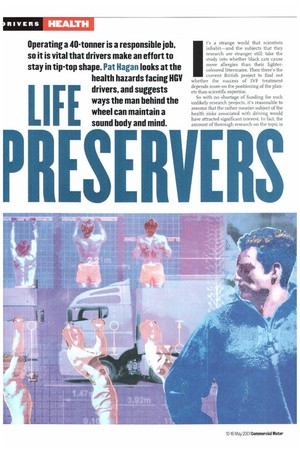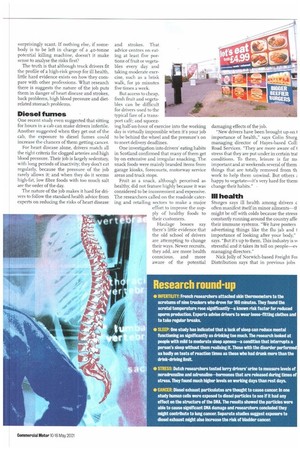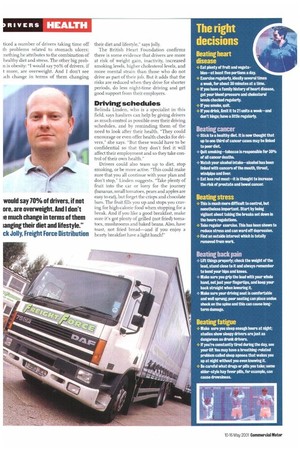stay in tip-top shape. Pat Hagan looks at the health
Page 40

Page 41

Page 42

If you've noticed an error in this article please click here to report it so we can fix it.
hazards facing HGV drivers, and suggests ways the man behind the wheel can maintain a sound body and mind.
PRESERVERS
L's a strange world that scientists inhabit—and the subjects that they research are stranger still: take the study into whether black cats cause more allergies than their lightercoloured littermates. Then there's the current British project to find out whether the success of IVF treatment depends more on the positioning of the planets than scientific expertise.
So with no shortage of funding for such unlikely research projects, it's reasonable to assume that the rather meatier subject of the health risks associated with driving would have attracted significant interest. In fact, the amount of thorough research on the topic is surprisingly scant. If nothing else, if somebody is to be left in charge of a 4o-tonne potential killing machine, doesn't it make sense to analyse the risks first?
The truth is that although truck drivers fit the profile of a high-risk group for ill health, little hard evidence exists on how they compare with other professions. What research there is suggests the nature of the job puts them in danger of heart disease and strokes, back problems, high blood pressure and dietrelated stomach problems.
Diesel fumes
One recent study even suggested that sitting for hours in a cab can make drivers infertile. Another suggested when they get out of the cab, the exposure to diesel fumes could increase the chances of them getting cancer.
For heart disease alone, drivers match all the right criteria for dogged arteries and high blood pressure. Their job is largely sedentary, with long periods of inactivity; they don't eat regularly, because the pressure of the job rarely allows it; and when they do it seems high-fat, low fibre foods with too much salt are the order of the day.
The nature of the job makes it hard for drivers to follow the standard health advice from experts on reducing the risks of heart disease and strokes. That advice centres on eating at least five portions of fruit or vegetables every day and taking moderate exercise, such as a brisk walk, for 3o minutes five times a week.
But access to cheap, fresh fruit and vegetables can be difficult for drivers used to the typical fare of a transport cafe; and squeezing half-an-hour of exercise into the working day is virtually impossible when it's your job to be behind the wheel and the pressure's on to meet delivery deadlines.
One investigation into drivers' eating habits in Scotland confirmed that many of them get by on extensive and irregular snacking. The snack foods were mainly branded items from garage kiosks, forecourts, motorway service areas and truck stops.
Fruit as a snack, although perceived as healthy, did not feature highly because it was considered to be inconvenient and expensive. The researchers called on the roadside catering and retailing sectors to make a major effort to improve the supply of healthy foods to their customers.
Haulage bosses say there's little evidence that the old school of drivers are attempting to change their ways. Newer recruits, they add, are more health conscious, and more aware of the potential damaging effects of the job.
"New drivers have been brought up on I importance of health," says Cohn Sturg managing director of Hayes-based Colli Road Services. "They are more aware of stress that they are put under in certain trai conditions. To them, leisure is far Inc important and at weekends several of them things that are totally removed from th work to help them unwind. But others happy to vegetate—it's very hard for them change their habits."
lU health Sturges says ill health among drivers c often manifest itself in minor ailments—if might be off with colds because the stress constantly running around the country affe their immune systems. "We have posters advertising things like the flu jab and t importance of looking after your body,says. "But it's up to them. This industry is vi stressful and it takes its toll on people—ev managing directors."
Nick folly of Norwich-based Freight Foi Distribution says that in previous jobs ticed a number of drivers taking time off th problems related to stomach ulcers; mething he attributes to the combination of healthy diet and stress. The other big probn is obesity: "I would say 7096 of drivers, if t more, are overweight. And I don't see rich change in terms of them changing their diet and lifestyle," says jolly.
The British Heart Foundation confirms there is some evidence that drivers are more at risk of weight gain, inactivity, increased smoking levels, higher cholesterol levels, and more mental strain than those who do not drive as part of their job. But it adds that the risks are reduced when they drive for shorter periods, do less night-time driving and get good support from their employers.
Driving schedules
Belinda Linden, who is a specialist in this field, says hauliers can help by giving drivers as much control as possible over their driving schedules, and by reminding them of the need to look after their health. "They could encourage or even offer health checks for drivers," she says. "But these would have to be confidential so that they don't feel it will affect their employment and so they take control of their own health."
Drivers could also team up to diet, stop smoking, or be more active. "This could make sure that you all continue with your plan and don't stop," Linden suggests. "Take plenty of fruit into the car or lorry for the journey (bananas, small tomatoes, pears arid apples are easy to eat), but forget the crisps and chocolate bars. The fruit fills you up and stops you craving for high-calorie food when stopping for a break. And if you like a good breakfast, make sure it's got plenty of grilled (not fried) tomatoes, mushrooms and baked beans. Also, have toast, not fried bread—and if you enjoy a hearty breakfast have a light lunchl"








































































































